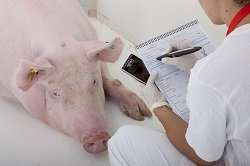Credit: PROHEALTH
The intensification of farming increases the risk and susceptibility of pigs and chickens getting production diseases. This makes animal husbandry practices less efficient, resulting in huge financial losses.
Production diseases refer to those conditions that are associated with the intensity of the production of a livestock system. They are induced by management procedures. Production diseases harm animal health and welfare, lead to inefficiencies that reduce profitability and product quality, and increase environmental footprint and antibiotic use. Such diseases are estimated to lower the efficiency of pig and poultry systems by 10-15 percent.
"The evolution of production diseases is clearly challenging existing options to prevent and control them," says Prof. Ilias Kyriazakis, coordinator for the EU-funded PROHEALTH (Sustainable intensive pig and poultry production) project. "There's a need for new tools and innovative solutions." To address this issue, the project is developing effective control strategies to reduce the negative impact of the conditions on animal health and welfare.
New knowledge to develop effective management and control strategies
Now in its fifth and final year, PROHEALTH has made several key findings. They include determining the biosecurity score and risk factors for production diseases in pig, broiler and layer chicken, and turkey farms across the EU.
Project partners identified the genetic and environmental factors involved in neonatal survival that exert long-term developmental influences on the health of pigs and poultry. They also characterised novel phenotypic markers of beneficial sow physiological and behavioural traits. These will be applied in genetic selection to improve piglet survival. Research showed that sows from a more enriched gestation environment, and those given improved human-animal interactions, have reduced stress and lower neonatal piglet mortality.
The project team also identified the most common production diseases in broiler breeder production and found that Escherichia coli infections were the most common cause of mortality. The foot pad was shown to be a possible port of entry for Gram positive bacteria, resulting in increased mortality and poor health.
In addition, PROHEALTH conceived nutritional strategies for reducing the prevalence of production diseases in pigs and poultry. The strategies accounted for the interaction between nutrition and genotype in such livestock. Good hygiene during housing improved pig health in the growing-finishing phase and pig weight at slaughter. However, these improvements were largely affected by pig genotypes, so not all pigs benefited equally from ideal environments.
By using innovative environmental monitoring sensors, researchers quantified the farm environment's contribution to the expression of respiratory diseases in pigs over time. They developed novel genetic biomarker panels that could potentially diagnose production diseases in pigs and poultry. A genetic signature that can determine pigs with respiratory deficiencies and significant gene expression changes associated with lumbar kyphosis (humpy-back pigs) was also identified.
On the right path to improved health and welfare for pigs and poultry
PROHEALTH is currently synthesising the results and drawing up recommendations on the most viable ways to control production diseases that add value, are societally acceptable and have a true impact on animal health. "The outcomes will help stakeholders make informed choices on how to best control production diseases," notes Prof. Kyriazakis.
During the final six months, the project will produce a series of best practice guidelines and policy briefs based on the results. It will also identify economically viable and socially acceptable ways to control pathologies, with an emphasis on animal welfare implications.
"Ultimately, PROHEALTH will enable the production of better quality products in a welfare-friendly manner, while improving the competitiveness and sustainability of modern pig and poultry farming in Europe," concludes Prof. Kyriazakis.
Provided by CORDIS
























